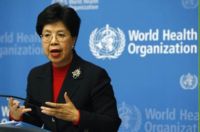World Health Organization: Transparency, better health structures can help tackle threats
The general director of the World Health Organization says that the global community must adopt a broad approach to deal with health threats that cross borders, taking lives and damaging economies

In a forum to discuss World Health Day, April 7, a panel of experts urged greater transparency from governments and health bodies and insisted on the importance of improving national health structures to deal with new risks.
"All nations are at risk. This universal vulnerability creates a need for collective defenses and for shared responsibility in making these defenses work," said Margaret Chan, who became WHO director-general last November.
The forum addressed the threats of newly emerging diseases - such as bird flu and SARS - environmental change, the danger of bioterrorism, humanitarian emergencies and the impact of HIV/AIDS. It was co-sponsored by WHO and the Singapore government.
Chan said a nation's willingness to share information and its own health knowledge and infrastructure were the most critical challenges to a successful global approach to threats.
She said revised International Health Regulations that come into effect on June 15 would strengthen cooperation by helping to strengthen public health capacity and strengthening requirements so that "any public health emergency of international concern" gets reported, Chan said.
"We must work together as a global community to bring to bear a collective defense system that can mitigate the risk to the entire humankind," she said.
The participants also suggested greater collaboration with private industries who had the contacts, logistics and experience to spread information and supplies quickly and efficiently.
Singapore Prime Minister Lee Hsien Loong questioned why health agencies did not release more data and share viral samples, for example, just as intelligence agencies and other bodies have cooperated in the war on terror.
"To deal effectively with future global health threats which are yet unknown but possibly catastrophic, we must share information, combine our efforts and pool our resources," Lee said.
"Our experience with SARS has demonstrated the importance of rapid and transparent information exchange between countries and the WHO," he said.
Indonesia agreed last week to resume sending virus samples to WHO on condition they would not be made freely available to commercial vaccine makers.
Earlier, Indonesia had stopped sharing specimens over fears they would be used to develop vaccines that would then be unaffordable to poor nations in the event of a pandemic.
More than 8,000 people were infected with SARS worldwide in 2003, resulting in 774 deaths. In Singapore, 33 people died and 238 others were infected.
Balaji Sadasivan, senior state minister in Singapore's Foreign Ministry, succinctly summed up why global health cooperation was such a crucial issue: "One country's sneeze may cause a cold somewhere else in the world."
Subscribe to Pravda.Ru Telegram channel, Facebook, RSS!





